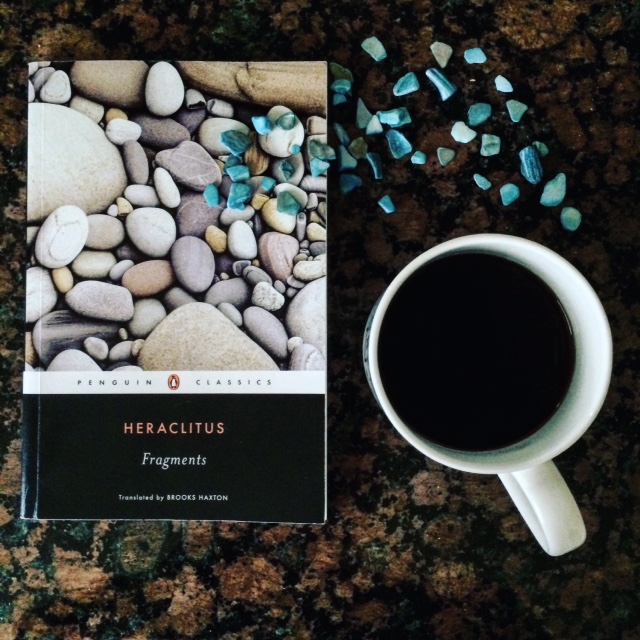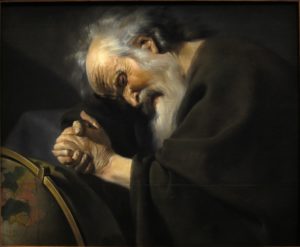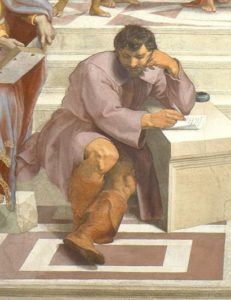
Fragments is book #6 from The Literary Project.
Heraclitus of Ephesus (535-475 BCE) was heir to the throne of the powerful ancient Greek city (located on the western coast of modern-day Turkey), but chose to abdicate the throne to pursue a life of wisdom instead. “For hundreds of years, great writers, Plato, Aristotle, Marcus Aurelius, and others, quoted him with respect.” His book is considered to be the first philosophical work–wherein his use of the word “Logos” (meaning “word,” “principle,” “reason,” and “opinion,” among other subtle interpretations ) officially became a technical term in philosophy–and yet it was tragically lost; presumably in the destruction of the Temple of Artemis which is where his book had resided. This means that what we know of his sayings, we know only secondhand.
We know that he had a poor opinion of his fellow man and despaired at the majority of humans’ blindness to reality (“People dull their wits with gibberish, and cannot use their ears and eyes.” -Fragment #4), and thus he is sometimes called “the weeping philosopher.” While his thoughts covered a variety of subjects, his overall philosophy can be summed up in 3 prominent themes: wisdom & self-knowledge, the universe in constant change, and the unity of opposites.

On Wisdom & Self-Knowledge
Wisdom, according to Heraclitus, is a state of being: a silent experience of oneness with the ineffable.
“Of all the words yet spoken,
none comes quite as far as wisdom,
which is the action of the mind
beyond all things that may be said.”
(Fragment #18)
“Wisdom is the oneness
of mind that guides
and permeates all things.”
(Fragment #19)
Wisdom is also self-knowledge. The famous Greek maxim “Know Thyself” (which, famously, had been carved into the Temple of Apollo at Delphi) has been attributed to several ancient Greek sages from the 6th century BCE (including Solon of Athens). Heraclitus echoes it in his fragments:
“Applicants for wisdom
do what I have done:
inquire within”
(Fragment #80)
“All people ought to know themselves
and everyone be wholly mindful.”
(Fragment #106)
On Change
I find Heraclitus’ wisdom about change to be most enlightening. I also find it especially fascinating, simply because at the same moment in history, over 3,000 miles away, Siddhartha Gautama also gave up his throne to live a life of wisdom, and was also teaching the truth of impermanence!
“By cosmic rule,
as day yields night,
so winter summer,
war peace, plenty famine.
All things change.
Fire penetrates the lump
of myrrh, until the joining
bodies die and rise again
in smoke called incense.”
(Fragment #36)
Here is his most famous fragment (it is usually translated simply as “You cannot step into the same river twice.”):
“The river
where you set
your foot just now
is gone–
those waters,
giving way to this,
now this.”
(Fragment #41)
Another fascinating coincidence: Confucius, just like Gautama, was also alive during this same time. Here we have another man, in a completely different region of the world, who was standing by a stream and observed, “All is transient, like this! Unceasing day and night!” (The Analects, Book IX, Chapter xvi)
Amazing!
Here is a fragment similar to #41:
“Just as the river where I step
is not the same, and is,
so I am as I am not.”
(Fragment #81)
The last line, “so I am as I am not” segues well into the concept of the unity of opposites.
On The Unity of Opposites
Heraclitus, believing the world in constant flux, claimed that everything in existence inhabited their opposite states simultaneously.
“From the strain
of binding opposites
comes harmony.”
(Fragment #46)
“The sea is both pure
and tainted, healthy
and good haven to the fish,
to men impotable and deadly”
(Fragment #52)
In other words (the way that I have come to understand it), the sea simply is. It is not inherently this or that. It’s quality depends on the perspective (good for fish, bad for men). In this way opposite states coexist harmoniously.
Things are as they are regardless of our perception (“intelligence”) and judgement (which makes me think of Shakespeare’s Hamlet as he expresses, “There is nothing either good or bad but thinking makes it so.”):
“While cosmic wisdom
understands all things
are good and just,
intelligence may find
injustice here, and justice
somewhere else.”
(Fragment #61)
And then, there is the contrasting of opposites and how their existence plays into gratitude:
“Always having what we want
may not be the best good fortune.
Health seems sweetest
after sickness, food
in hunger, goodness
in the wake of evil, and at the end
of daylong labor sleep.”
(Fragment #104)
Other Favorite Framents
The concept of “oneness” in the universe expressed here made me think of Buddhism–much like the parallel between Haraclitus’ change and the Buddha’s impermanence:
“…know that all is one.”
(from Fragment #2)
This one, being the nerd that I am, reminded me of the first law of thermodynamics (matter is neither created nor destroyed, but can be changed from one form to another):
“That which always was,
and is, and will be everliving fire,
the same for all, the cosmos,
made neither by god nor man,
replenishes in measure
as it burns away.”
(Fragment #20)
And this one made me laugh, having been many times in the situation of having much wine with easy company:
“Not to be quite such a fool
sounds good. The trick,
with so much wine
and easy company, is how.”
(Fragment #108)
This one further reflects his dislike for his fellow man, and I found it amusing:
“Homer I deem worthy–
in a trial by combat–
of good cudgeling,
and Archilochos the same.”
(Fragment #119)
(I’m not sure why he thinks Homer needs a beating…)
And finally, I find the following three fragments to be lovely nuggets of wisdom that can be observed day-to-day:
“Any day stands
equal to the rest.”
(Fragment #120)
“One’s bearing
shapes one’s fate.”
(Fragment #121)
“Silence, healing.”
(Fragment #130)

